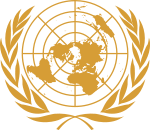Chapter II of the United Nations Charter
- Chapter II of the United Nations Charter
-
Chapter II of the United Nations Charter deals with membership of the United Nations organization. Membership is open to the original signatories and "all other peace-loving states which accept the obligations contained in the present Charter and, in the judgment of the Organization, are able and willing to carry out these obligations." A country can only be admitted to the UN after the UN General Assembly votes to do so upon the recommendation of the UN Security Council. The required assent of the permanent five (P5) members of the Security Council (People's Republic of China, France, Russian Federation, the United Kingdom, and the United States of America) no doubt accounts for why admission to membership in the UN is regarded as an important indicator of sovereignty and legitimate statehood (especially for microstates). On the other hand, some de facto-acknowledged independently-governed countries such as Taiwan have not been admitted to the UN due a veto by a P5 member. During the Cold War, the USA and the USSR did not allow the admission of countries from rival blocs for a while, but then began letting those countries join, which led to a period of great expansion of UN membership, especially as the number of sovereign countries increased due to colonies gaining independence.
Chapter II also provides for the suspension and expulsion of member countries from the UN by the UN General Assembly upon the recommendation of the UN Security Council, and for the restoration of rights to suspended members by the Security Council. Partly because of the procedure set out in this chapter, Taiwan has questioned the legality of United Nations General Assembly Resolution 2758 which declared that the People's Republic of China was the legitimate holder of the Chinese seat and that the Taiwanese delegation was to be expelled forthwith. In 2005, Israel called for the expulsion of Iran, apparently interpreting the latter's calls for the destruction of Israel as having "persistently violated the Principles contained in the present Charter" and thus meeting the Article 6 criteria for expulsion[1].
References
Wikimedia Foundation.
2010.
Look at other dictionaries:
Chapter VII of the United Nations Charter — sets out the UN Security Council s powers to maintain peace. It allows the Council to determine the existence of any threat to the peace, breach of the peace, or act of aggression and to take military and nonmilitary action to restore… … Wikipedia
Chapter I of the United Nations Charter — lays out the purposes and principles of the United Nations organization. These principles include the equality and self determination of nations and the obligation of member countries to obey the Charter, to cooperate with the UN Security Council … Wikipedia
Chapter IV of the United Nations Charter — contains the Charter s provisions dealing with the UN General Assembly, specifically its composition, functions, powers, voting, and procedures. Contents 1 Primacy of the General Assembly 2 Articles 10, 11, 12, 13, 14, 15, and 16 3 Article 17 … Wikipedia
Chapter VI of the United Nations Charter — deals with peaceful settlement of disputes. It requires countries with disputes that could lead to war to first of all try to seek solutions through peaceful methods such as negotiation, enquiry, mediation, conciliation, arbitration, judicial… … Wikipedia
Chapter III of the United Nations Charter — summarizes the principal organs of the United Nations. They are listed in the same order as the chapters detailing their composition, functions, and powers appear in the Charter. The placement of the General Assembly first in the list probably is … Wikipedia
Chapter IX of the United Nations Charter — deals with international economic and social cooperation. Article 55 reflects the philosophy of the UN that efforts should be made to impact the root causes of war: With a view to the creation of conditions of stability and well being which are… … Wikipedia
Chapter XVI of the United Nations Charter — contains miscellaneous provisions prohibiting secret treaties, establishing the UN Charter as supreme over any other treaties, and providing for privileges and immunities of UN officials and representatives. Contents 1 Article 102 2 Article 103 3 … Wikipedia
Chapter V of the United Nations Charter — contains provisions establishing the United Nations Security Council. Article 23 establishes the composition of the Security Council, with five permanent members (the Republic of China, France, the Soviet Union, the United Kingdom, and the United … Wikipedia
Chapter VIII of the United Nations Charter — deals with regional arrangements. It authorizes regional organizations (such as NATO) and even requires attempts to resolve disputes through such agencies (if available) prior to intervention by the UN Security Council. However, Article 53… … Wikipedia
Chapter XV of the United Nations Charter — deals with the UN Secretariat. It designates the UN Secretary General as the chief administrative officer of the organization, which includes the staff of ECOSOC, the Trusteeship Council, and other organs. Similarly to how the US Constitution… … Wikipedia

